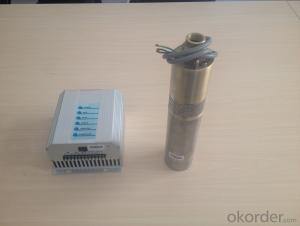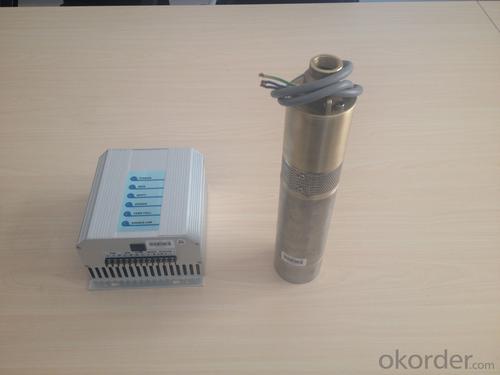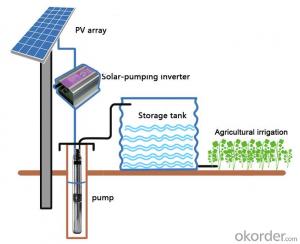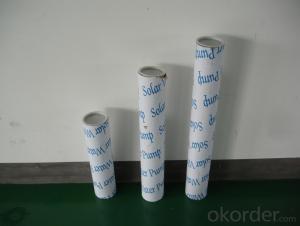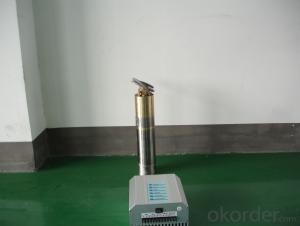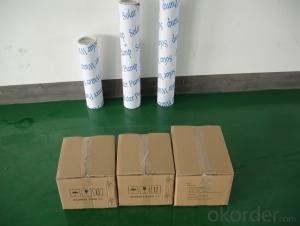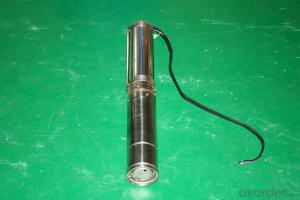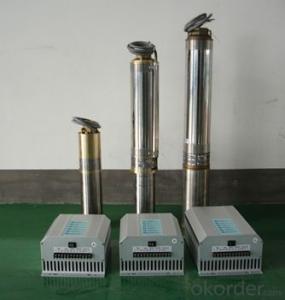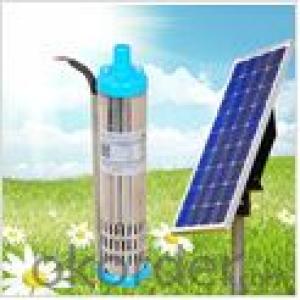Shakti Solar DC Solar Submersible Pumps
- Loading Port:
- China Main Port
- Payment Terms:
- TT OR LC
- Min Order Qty:
- -
- Supply Capability:
- -
OKorder Service Pledge
OKorder Financial Service
You Might Also Like
Item Description :
This superb new addition to our solar fountain range comes with a 10w solar panel,and a powerful fountain pump that is capable of producing fountains of up to 2m in height. As well as being easy to set up and use.Instruction manual is supplied for assembly and maintenance.
Solar Fountain Key Features :
Powered by direct sunlight
No high voltage electric mains required
Safe for children
Max. height of fountain: 2M
Max. flow capacity: 800 L/H(176 GAL)
10W Polycrystalline solar panel included
18V DC brushless pump
Solar Pump Features :
Can produce fountains up to : 2M (tube height) 1.4M (fountain height)
Comes with multiple nozzle accessories
Cable Length : 5M
Solar Panel Features :
10W peak power.
Polycrystalline highly efficient solar panel
Comes mounted in aluminium frame
Comes with ground stake and rotating knob so you can angle your panel toward the sun
What You Will Get :
10W solar panel
Solar pump
Ground Sake
Nozzle accessories
Precautions :
DO NOT alter or change the product itself or its components
Operate pump in freshwater only, never above 50 degrees celsius
Keep away from flammable liquids
Do not connect to any other power supply other than the included
- Q: Can a solar pump be used in areas with limited access to local suppliers for replacement parts?
- Yes, a solar pump can be used in areas with limited access to local suppliers for replacement parts. Solar pumps are designed to be durable and have minimal maintenance requirements. They often come with long-lasting components that are resistant to wear and tear. Additionally, solar pumps are relatively simple in design and require fewer replacement parts compared to traditional pumps. In case of any issues, remote or online support can be sought, and replacement parts can be ordered and shipped to the area if necessary.
- Q: Can a solar pump be used for swimming pools or fountains?
- Yes, a solar pump can definitely be used for swimming pools or fountains. Solar pumps are an environmentally-friendly alternative to traditional electric pumps as they harness the power of the sun to circulate water. They are particularly suitable for swimming pools and fountains because they are designed to handle the relatively low flow rates and water volumes typically associated with these applications. Additionally, solar pumps have the advantage of being independent of the electrical grid, making them a cost-effective and sustainable choice for pool and fountain owners. They are easy to install, require minimal maintenance, and can provide consistent and reliable water circulation without the need for excessive energy consumption.
- Q: Can a solar pump be used in areas with limited access to backup battery systems?
- Yes, a solar pump can be used in areas with limited access to backup battery systems. Solar pumps are designed to operate directly on solar power, eliminating the need for backup batteries. They can efficiently convert sunlight into energy to power the pump, making them ideal for remote locations or areas with limited access to electricity or backup battery systems.
- Q: How does a solar pump handle water with high levels of algae or cyanobacteria blooms?
- A solar pump can handle water with high levels of algae or cyanobacteria blooms by utilizing various filtration systems. These systems, such as screens or mesh filters, help prevent algae or cyanobacteria from entering the pump system, thus reducing the risk of clogging or damage. Additionally, some solar pumps have built-in UV sterilizers that destroy algae or cyanobacteria cells, ensuring cleaner water output. Overall, solar pumps are designed to handle water with high levels of algae or cyanobacteria blooms effectively and efficiently.
- Q: Is it possible to store excess solar energy generated by the pump?
- Yes, it is possible to store excess solar energy generated by the pump. One common method of storing excess solar energy is through the use of batteries. These batteries can store the excess energy generated during the day and then release it during periods when the pump is not generating enough energy, such as at night or during cloudy days. Additionally, other energy storage technologies such as thermal energy storage or hydrogen fuel cells can also be used to store excess solar energy for later use by the pump. These storage solutions allow for a more efficient and reliable use of solar energy, ensuring that the pump can operate even when there is no direct sunlight available.
- Q: Can solar pumps be used for water supply in military bases or camps?
- Yes, solar pumps can be used for water supply in military bases or camps. Solar pumps are an efficient and sustainable solution for providing water in remote locations. They can operate independently of grid power, making them suitable for off-grid military bases or camps. Additionally, solar pumps require minimal maintenance, reduce dependency on fuel, and have a long lifespan, making them an ideal choice for military water supply systems.
- Q: Can solar pumps be used in areas with high humidity or heavy rainfall?
- Yes, solar pumps can be used in areas with high humidity or heavy rainfall. The performance of solar pumps is not significantly affected by humidity or rainfall as long as they are properly installed and maintained. The solar panels are designed to withstand various weather conditions and can still generate electricity even in rainy or humid environments.
- Q: Can a solar pump be used for water supply in off-grid hospitals?
- Yes, a solar pump can be used for water supply in off-grid hospitals. Solar pumps are a sustainable and reliable solution that can provide a constant and clean water supply without the need for grid electricity. They can be easily installed in remote areas and operate efficiently using solar energy, making them ideal for off-grid hospitals that lack consistent access to electricity.
- Q: Can a solar pump be used in natural swimming pools?
- Yes, a solar pump can be used in natural swimming pools. Solar pumps are a great eco-friendly option for circulating and filtering water in a natural swimming pool, as they rely on solar energy to operate and do not require electricity from the grid. They help maintain the water quality and ensure proper circulation while minimizing environmental impact.
- Q: How does a solar pump help in reducing dependence on fossil fuels?
- A solar pump helps reduce dependence on fossil fuels by harnessing energy from the sun to power the pump instead of relying on non-renewable sources like coal, oil, or natural gas. By using solar energy, it eliminates the need for fossil fuels, thereby reducing carbon emissions and mitigating climate change impacts. Additionally, a solar pump provides a sustainable and cost-effective alternative for pumping water, making it an environmentally friendly solution that decreases reliance on finite fossil fuel resources.
Send your message to us
Shakti Solar DC Solar Submersible Pumps
- Loading Port:
- China Main Port
- Payment Terms:
- TT OR LC
- Min Order Qty:
- -
- Supply Capability:
- -
OKorder Service Pledge
OKorder Financial Service
Similar products
Hot products
Hot Searches
Related keywords
